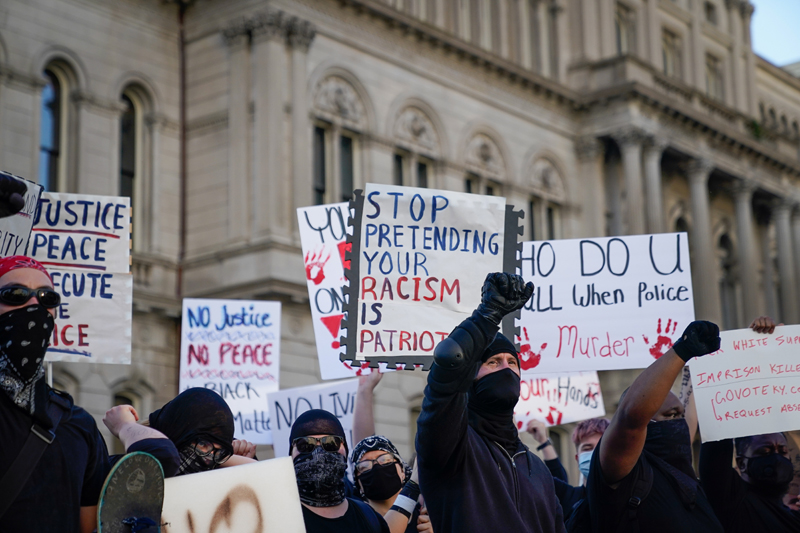Protests flare across America, arrest of Minneapolis police officer fails to appease
MINNEAPOLIS: The white former Minneapolis police officer shown in video footage using his knee to pin an unarmed black man's neck to the street was charged with murder on Friday in the man's death, an incident that has unleashed four nights of violent protests.
Derek Chauvin, who was dismissed from the police department with three fellow officers the day after the fatal encounter, was arrested on third-degree murder and manslaughter charges for his role in Monday's death of 46-year-old George Floyd.
The charges brought by Hennepin County prosecutors came after a third night of arson, looting and vandalism in Minnesota's largest city that saw protesters set fire to a police station and the National Guard deployed to help restore order.
Mayor Jacob Frey said he ordered police late on Thursday to retreat from the precinct station to prevent an escalation of violence. But on Friday night, law enforcement officers were out in force again.
Authorities had hoped Chauvin's arrest would allay public anger and avert continued unrest. But defying an 8 p.m. curfew imposed by the mayor, about 500 demonstrators clashed anew Friday evening with riot police outside the battered Third Precinct building.
Police, who created a two-block buffer area around the precinct house, opened fire with tear gas, plastic bullets and concussion grenades, sending the crowd scattering.
There were also sympathy protests on Friday in several cities across the country, including New York, Denver, Houston, Atlanta, Detroit and Louisville, Kentucky.
Hennepin County Attorney Mike Freeman, announcing Chauvin's arrest earlier in the day, said a key piece of evidence in the case was the widely seen video footage, taken with an onlooker's cellphone, showing Floyd lying face down in the street, with Chauvin kneeling on the back of Floyd's neck.
The graphic footage shows Floyd gasping for air and pleading for help as he repeatedly groaned, "please, I can't breathe," while a crowd of anguished bystanders shouted at police to let the man up.
After several minutes, Floyd gradually grows unresponsive and ceases to move. He was pronounced dead at a local hospital a short time later.
"We have evidence, we have the citizen's camera's video, the horrible, horrific, terrible thing we have all seen over and over again," Freeman said. "We have the officer's body-worn camera, we have statements from some witnesses."
Chauvin had his knee on Floyd's neck for 8 minutes and 46 seconds, according to an autopsy report. Medical examiners found the combined impact of being restrained by police, underlying health conditions and any potential intoxicants in his system likely contributed to his death.
Floyd, a Houston native who had worked security for a nightclub, was arrested for allegedly using counterfeit money at a store to buy cigarettes on Monday evening. An employee who called police described the suspect as possibly drunk, according to an official transcript of the call.
Freeman said the investigation into Chauvin, who faces up to 25 years in prison if convicted, was ongoing and he anticipated also charging the three other officers, identified by the city as Thomas Lane, Tou Thao and J Alexander Kueng.
The prosecutor said it was appropriate to charge "the most dangerous perpetrator" first.
'HARROWING'
US Attorney General William Barr called the video "harrowing and deeply disturbing" in a written statement and said a parallel federal investigation would determine if the officers violated civil rights laws.
Floyd's death recalled the 2014 killing of Eric Garner, an unarmed black man in New York City, who died after being put in a police chokehold and telling the officers, "I can't breathe."
Mike Griffin, a community organizer in Minneapolis, said the protests reflected years of frustration over economic inequalities and the feeling that black lives were not valued as highly by police.
He said anger has been building since the 2015 fatal shooting by Minneapolis police of 24-year-old Jamar Clark, and the 2016 killing of Philando Castile, a 32-year old black man shot by Minnesota police during a traffic stop.
"George's murder was just the last straw," Griffin told Reuters, calling the charges against Chauvin a step in the right direction, but adding there needed to be systemic changes.
The protests were driven in part by the initial lack of arrests in the case.
But Freeman stressed that charges in similar cases typically take nine months to a year, adding, "This is by far the fastest we've ever charged a police officer."
Earlier on Friday, Minnesota Governor Tim Walz said he understood why people had "lost faith" in the police but argued Floyd's plight had become "lost in 48 hours of anarchy" and called for an end to destruction of property. He has declared a state of emergency and called in the state's National Guard.
The governor also apologized to CNN after police arrested three members of its TV crew during an early morning sweep.
Separately, CNN's headquarters in Atlanta came under violent attack by protesters who smashed windows in the lobby of that building as riot police stood guard.






